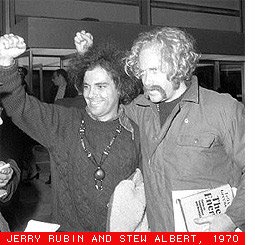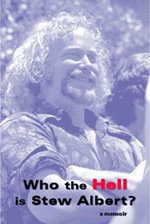

Stew Albert died, January 30, 2006 at 3:20 a.m, age 66. Peacefully, in his sleep, surrounded by Judy, Jessica and his many friends. Funeral services this Wednesday, Feb. 1 at Havurah Shalom in Portland.
Here is his last posting to his blog about 14 hours before he died from cancer:
"Day in the Life: Super crazy thing. The hospice nurse had to do more. Still me. Still me."
During the Viet Nam War I identified as a Yippie and participated in guerrilla theater in Athens, Ohio. When someone as important to the movement as Stew Albert passes on I have to pause and reflect on the gifts to humanity that he and many others gave through their dedication to justice. Rest in Peace Stew and may we meet and dance together in the next lifetime. I am grateful for your gifts.
Here is an article from the San Francisco Chronicle from October, 2004 interviewing Stew.
When politics met theater in the streets
- Heidi Benson
Sunday, October 10, 2004
"Rise up and abandon the creeping meatball!"
With this anti-establishment motto, and a handful of others, Jerry Rubin, Abbie Hoffman and a somewhat less well-known but no less central counterculture figure named Stew Albert founded the Youth International Party in 1967.
Serious political surrealists -- the Marx Brothers by way of Karl Marx -- the Yippies gained fame for attempting to levitate the Pentagon and for running a live pig for president, among other protests against the Vietnam War.
Albert has now written a page-turner of a memoir called "Who the Hell Is Stew Albert?" published this summer by Red Hen Press.
By his own definition, Albert was an "almost-nice Jewish boy who grew up in Brooklyn between World War II and the Cold War." But when he hopped a bus to San Francisco in 1964, trying to get over a broken heart, he met up with history.
At that moment, what would become a decade of social protest was just getting started at UC Berkeley. First came the Free Speech Movement, launched in 1964 to protest campus crackdowns on freedom of expression. Albert -- like thousands of other young people -- was attracted to the FSM's insistence that students had the same constitutional rights as adults.
The FSM opened the door for the Vietnam Day Committee, the Berkeley anti- war group that staged one of the nation's largest campus teach-ins about Vietnam in 1965. Albert soon became a leader of the committee.
By 1967, he had helped launch the Yippies, who married politics with guerrilla theater of the absurd.
"Our big contribution was our theatrical approach," Albert says by phone from his home in Portland, Ore. "When we wanted to satirize greed, we threw money at stockbrokers," which they did on the floor of the U.S. Stock Exchange. "When we wanted to satirize the election, we took a live pig and ran him for president. We tried to be inventive and creative in developing tactics, and we had the belief that if we did it right, we could change the world."
Reminiscing was the motive when he began his memoir in the late '70s on the encouragement of friends. Jerry Rubin had suggested that it was his turn to write a book: "By now, you can be very truthful and you don't have to apologize." Rubin told him, "Be honest."
The book is candid, written from the point of view of someone at the center of major protests that raised the hackles of law enforcement officials everywhere. (Albert was an unindicted co-conspirator in the alleged plot to disrupt the 1968 Democratic Convention in Chicago.)
He was intimately involved with some of the most flamboyant characters of the time -- including Eldridge Cleaver, Timothy Leary, Allen Ginsberg and William Burroughs -- often in rather mind-altering circumstances.
"I thought that the book would just be for my generation," Albert says, "and that it might be of some use to historians." But the direction of the book changed when he was swamped with e-mails from young people in response to his Web site (members.aol.com/stewa/stew.html).
"They knew a surprising amount about all of us and they wanted to exchange ideas," he says. "That made me think this book could also be of use to them."
So Albert put more stress on the dynamics of activism, what he calls "the how-to-do-it aspect."
"I wanted to give young activists a sense of how we organized things, how our creativity worked," he says, "and I've been getting very positive responses from young people who are reading the book."
His saw his first job as a kind of warts-and-all demystification. His generation didn't escape the ravages of drugs, for example, and those stories aren't left out.
"People today who are starting to organize tend to see what we did as beyond their own achievement, or from an era of mythology," he says. "I tried to portray us as human beings who did human things."
Today, Albert believes a new anti-war movement will continue to grow no matter who wins next month's presidential election.
"The opposition to the war in Iraq is much too large now to contain," he says. Such a movement "will have more influence over a Kerry administration than a Bush administration," he says.
"It will be like the effect of the civil rights movement, which pressured John F. Kennedy from the outside to do what, deep down, he knew was right."
With a bit of his old Yippie theatrical style, Albert says he's "shocked" that his book has been noticed.
"I've had a good response -- but I resent Clinton's memoir outselling mine," he says, then pauses.
"Who the hell is Bill Clinton?!"
E-mail Heidi Benson at hbenson@sfchronicle.com.
URL: http://sfgate.com/cgi-bin/article.cgi?file=/chronicle/archive/2004/10/10/RVG1H91FS11.DTL
©2006 San Francisco Chronicle
No comments:
Post a Comment